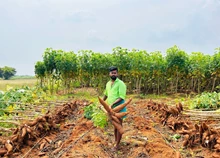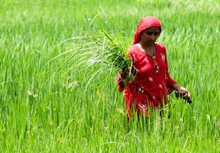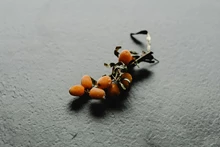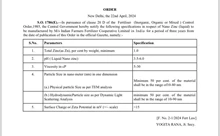
A recent study examining the advantages and challenges of direct seeded rice (DSR) cultivation has revealed promising outcomes for small farmers. The study found that small farmers experienced a remarkable 47% increase in yields and an 8% rise in net income when employing the DSR technique, compared to conventional puddling methods.
Direct-seeded rice (DSR) cultivation is emerging as a promising alternative to traditional methods, particularly for small and marginal farmers. A comprehensive study conducted by the Nudge Institute sheds light on the benefits associated with DSR, revealing its potential to enhance yields, increase income, and contribute to environmental sustainability.
DSR involves the direct sowing of rice seeds into the field, as opposed to the traditional method of growing seedlings in a nursery, and then transplanting into flooded fields. In contrast, traditional methods require the labour-intensive process of growing seedlings in nurseries before transplanting them into flooded fields. DSR relies on moist soil conditions rather than standing water, reducing water requirements and labour costs significantly. However, weed management poses a primary challenge in DSR, as it lacks the natural weed suppression provided by flooded fields in traditional puddling methods.
The study conducted by the Nudge Institute assessed the performance of DSR across three states, encompassing nine districts and six agro-climatic zones. Findings revealed that over 47% of small and marginal farmers experienced higher yields with DSR compared to traditional PTR methods. Despite challenges such as weed management and varying performance across regions, DSR showed potential to increase net income and reduce cultivation costs for small farmers.
The study highlighted several key findings:
-
While DSR yielded comparable or higher results in favourable conditions, weed management remained a significant challenge. However, DSR still offered an average 8% increase in net income for small farmers, with the potential for further income growth through government subsidies and carbon credits.
-
Performance varied across regions, influenced by factors such as irrigation, soil fertility, and support from partner organizations. Identifying suitable regions and providing adequate support are essential for successful DSR adoption.
-
Affordable weed control technology is critical for effective DSR implementation. Innovations in this area can drive adoption rates and support small farmers in overcoming weed-related challenges.
-
Farmers require proper guidance and support to adopt DSR successfully. A comprehensive playbook compiled by on-ground organizations can help farmers adhere to recommended practices and maximize yields.
In India, rice is grown on a large amount of land and is considered an important crop. With over 113 million acres of land used for paddy cultivation, the adoption of DSR has the potential to revolutionize rice farming practices across the country. By promoting DSR, India can enhance agricultural sustainability, reduce water consumption, and mitigate greenhouse gas emissions associated with traditional methods.
Direct-seeded rice cultivation presents a compelling opportunity for small and marginal farmers to improve yields, increase income, and promote environmental sustainability. While challenges such as weed management persist, strategic interventions and support mechanisms can facilitate the widespread adoption of DSR across diverse agro-climatic regions.
India can boost its agriculture sector and enable small farmers to prosper in a constantly shifting environment by utilizing the advantages of DSR.










